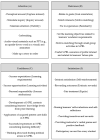The Effects of Simulation Problem-Based Learning on the Empathy, Attitudes toward Caring for the Elderly, and Team Efficacy of Undergraduate Health Profession Students
- PMID: 34574583
- PMCID: PMC8471944
- DOI: 10.3390/ijerph18189658
The Effects of Simulation Problem-Based Learning on the Empathy, Attitudes toward Caring for the Elderly, and Team Efficacy of Undergraduate Health Profession Students
Abstract
Undergraduate students studying health professions receive a uniprofessional education in an isolated educational environment within the university curriculum, and they have limited opportunities to experience collaborative learning through interactions with other professions. This study adopted a one-group, pretest-posttest, quasi-experimental design to investigate the effect of an undergraduate course that applied simulation problem-based learning (S-PBL) on nursing and dental hygiene students' empathy, attitudes toward caring for the elderly, and team efficacy. The S-PBL was designed based on the ARCS model of motivation proposed by Keller, and the subjects (n = 24) participated in a small group activity of identifying and checking for medical errors that may pose a threat to patients' safety. The results showed that there was a statistically significant increase in the subjects' attitudes toward caring for the elderly (t = 3.11, p = 0.01) and team efficacy (t = 2.84, p = 0.01) after participating in the S-PBL. The teaching method developed by this study aims to counteract the problems of the limited experience available to undergraduate health profession students during clinical practicum in the context of the COVID-19 pandemic and the limitations of interprofessional education, and it has established the groundwork for further exploration of the learning transfer effect of S-PBL.
Keywords: dental hygiene; elderly care; empathy; nursing; simulation problem-based learning; team efficacy.
Conflict of interest statement
The author declares no conflict of interest.
Figures
References
-
- Ruth F.C., Constance J.H. Fundamentals of Nursing: Human Health and Function. 5th ed. Lippincott Williams & Wilkins; Philadelphia, PA, USA: 2007.
-
- Bambini D., Washburn J., Perkins R. Outcomes of Clinical Simulation for Novice Nursing Students: Communication, Confidence, Clinical Judgment. Nurs. Educ. Perspect. 2009;30:79–82. - PubMed
-
- Sulaiman N., Rishmawy Y., Hussein A., Saber-Ayad M., Alzubaidi H., Al Kawas S., Hasan H., Guraya S.Y. A Mixed Methods Approach to Determine the Climate of Interprofessional Education among Medical and Health Sciences Students. BMC Med. Educ. 2021;21:203. doi: 10.1186/s12909-021-02645-4. - DOI - PMC - PubMed
-
- Birk T.J. Principles for Developing an Interprofessional Education Curriculum in a Healthcare Program. J. Healthc. Commun. 2017;2:9–12. doi: 10.4172/2472-1654.100049. - DOI
Publication types
MeSH terms
Grants and funding
LinkOut - more resources
Full Text Sources
Medical



